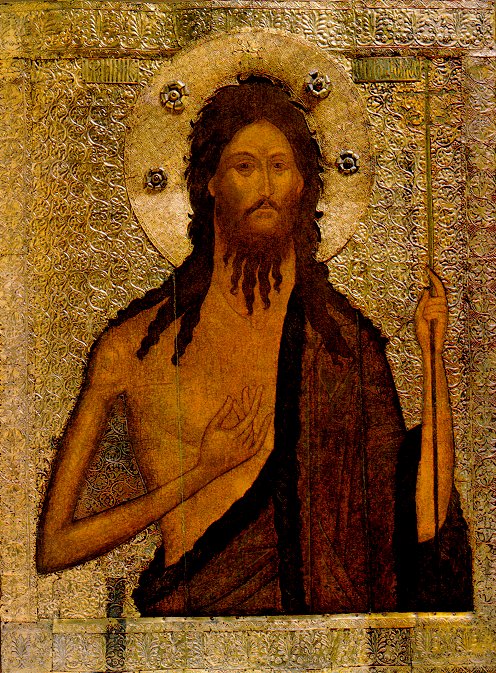John
the Baptist was unique—there was no one like him ever. He was the last prophet of ancient
Judaism. He was the first to baptize
people who were already in God’s community to restore the community to
God. He preached repentance for the sake
of preparing the community for God’s coming.
He proclaimed that the chosen one of God was coming. And he was the one who saw Jesus as the
chosen one of God and prepared him for his ministry by baptizing him. He, alone of all humans other than Jesus,
heard the voice of God proclaim Jesus as God’s Son. And he and Jesus connected in many ways over
the years of Jesus’ ministry
John
was preaching and baptizing as usual. He
was telling all of those who thought they were God’s people to repent. He said,
“Why are you coming to me? Who warned
you to flee from God’s wrath? The axe is
at the root of the tree, soon it will fall.
And every tree that does not bear fruit will be burned. Why do you call yourselves children of
Abraham? God could raise up descendents
of Abraham from the stones like you. You
are only a child of Abraham if you act like him!”
Many came to him, asking him how they should act
differently. He told the tax-gatherers,
“Take only what you have been appointed, cheat no one.” He told the soldiers, “Don’t harm people,
don’t accuse people, and be content with your wages.” He told everyone, “Be kind to your neighbor. If you have extra clothes or food and you see
someone who has need, give your extra to them.”
Some came from Jerusalem
John also spoke against the leaders of the Jews,
especially Herod Antipas, who married his brother’s wife in opposition to
Moses’ law. Herod’s wife, Herodias, was
furious, and she insisted that Herod arrest John. He sent his soldiers and arrested John, but
John’s disciples could still visit John and learn from him. Herod secretly visited John and listened to
John’s teachings.
At one point, John sent his disciples to Jesus to
ask him, “Are you really the one who is to come? Are you really the Christ? Or should we wait for another?” Jesus just told the followers of John to come
with him for a day. At the end of the
day, Jesus spoke to the disciples of John and said, “Now you can go back to John
and report to him. Tell him what you
have seen: the blind receive sight, the lame walk, the lepers are cleansed and
the poor have the gospel preached to them.
This is just as the prophets have said would happen on the final
day. The one who does not lose their
faith in me is blessed by God.”
After the disciples of John left, Jesus spoke to his
own disciples. “You all went out to John
to see him and to be baptized by him.
Why? Did you go to see a rich
man, so you could be like him? Did you
go to see a ruler, to be impressed by him?
No, for to see these kind of people you would have gone to
mansions. Of course, you went to see a
prophet of God—a rough man with rough clothing and speech. But he was more than a prophet, he was the
greatest man who lived. Yet, even the
least of the citizens of God’s kingdom is greater than he.”
After this, Herod held a great party and invited
some of the most important men in Israel
When Jesus heard that John was dead, he separated
himself from the people and mourned. And
a rumor went around that Jesus was John raised from the dead—and Herod feared
that it might be true.
The disciples asked Jesus, “If the kingdom of God


No comments:
Post a Comment
Please no spam, ads or inappropriate language.